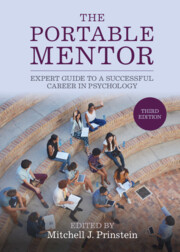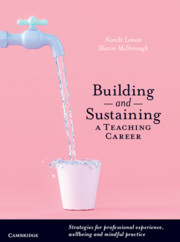33 results
Chapter 1 - The Life
- from Part I - Life and Times
-
-
- Book:
- Goethe in Context
- Published online:
- 16 May 2024
- Print publication:
- 23 May 2024, pp 9-19
-
- Chapter
- Export citation
Chapter 12 - Narrative Work Psychology
-
- Book:
- Applied Narrative Psychology
- Published online:
- 02 November 2023
- Print publication:
- 16 November 2023, pp 151-156
-
- Chapter
- Export citation
Professor David Skuse: a gentleman and a scholar
-
- Journal:
- BJPsych International / Volume 20 / Issue 4 / November 2023
- Published online by Cambridge University Press:
- 20 November 2023, pp. 78-79
- Print publication:
- November 2023
-
- Article
-
- You have access
- Open access
- HTML
- Export citation
Introduction
-
-
- Book:
- The Cambridge Companion to <i>Gulliver's Travels</i>
- Published online:
- 05 October 2023
- Print publication:
- 19 October 2023, pp 1-8
-
- Chapter
- Export citation
Linking high-performance work systems to work engagement: exploring the mediating role of perceived internal marketability
-
- Journal:
- Journal of Management & Organization , First View
- Published online by Cambridge University Press:
- 09 June 2023, pp. 1-13
-
- Article
- Export citation
37 - Working Outside Academia
- from Part V - Tips for a Successful Research Career
-
-
- Book:
- The Cambridge Handbook of Research Methods and Statistics for the Social and Behavioral Sciences
- Published online:
- 25 May 2023
- Print publication:
- 08 June 2023, pp 793-816
-
- Chapter
- Export citation
3 - Do You Have the Personal Qualities to Be a Community Consultant?
-
- Book:
- Guidebook to Community Consulting
- Published online:
- 16 March 2023
- Print publication:
- 23 March 2023, pp 38-52
-
- Chapter
- Export citation
Investigating the impact of volunteering with Melody Music Birmingham on the professional development and career pathways of Royal Birmingham Conservatoire students
-
- Journal:
- British Journal of Music Education / Volume 40 / Issue 2 / July 2023
- Published online by Cambridge University Press:
- 12 September 2022, pp. 220-233
- Print publication:
- July 2023
-
- Article
-
- You have access
- Open access
- HTML
- Export citation
Examining the association between personality traits and university faculty: a web-survey among Italian students
-
- Journal:
- European Psychiatry / Volume 65 / Issue S1 / June 2022
- Published online by Cambridge University Press:
- 01 September 2022, p. S180
-
- Article
-
- You have access
- Open access
- Export citation

The Portable Mentor
- Expert Guide to a Successful Career in Psychology
-
- Published online:
- 21 July 2022
- Print publication:
- 04 August 2022
Chapter 1 - Entrée to the ‘Other’ Germany
-
- Book:
- Victorian Women Writers and the Other Germany
- Published online:
- 02 June 2022
- Print publication:
- 09 June 2022, pp 13-31
-
- Chapter
- Export citation
2 - Studying a Poet
-
- Book:
- The Cambridge Guide to Reading Poetry
- Published online:
- 04 November 2021
- Print publication:
- 18 November 2021, pp 201-217
-
- Chapter
- Export citation
Introduction
-
-
- Book:
- The Cambridge Companion to Gadamer
- Published online:
- 29 July 2021
- Print publication:
- 12 August 2021, pp 1-14
-
- Chapter
- Export citation
1 - Gadamer (1900–2002)
-
-
- Book:
- The Cambridge Companion to Gadamer
- Published online:
- 29 July 2021
- Print publication:
- 12 August 2021, pp 15-43
-
- Chapter
- Export citation
Chapter 24 - Biographies
- from Part V - Afterlives
-
-
- Book:
- Ibsen in Context
- Published online:
- 23 April 2021
- Print publication:
- 15 April 2021, pp 215-222
-
- Chapter
- Export citation
International medical graduates: how can UK psychiatry do better?
-
- Journal:
- BJPsych Bulletin / Volume 45 / Issue 5 / October 2021
- Published online by Cambridge University Press:
- 02 December 2020, pp. 299-304
- Print publication:
- October 2021
-
- Article
-
- You have access
- Open access
- HTML
- Export citation
Success and the next generation of physician-scientists
-
- Journal:
- Journal of Clinical and Translational Science / Volume 4 / Issue 6 / December 2020
- Published online by Cambridge University Press:
- 15 June 2020, pp. 477-479
-
- Article
-
- You have access
- Open access
- HTML
- Export citation

Building and Sustaining a Teaching Career
- Strategies for Professional Experience, Wellbeing and Mindful Practice
-
- Published online:
- 26 June 2020
- Print publication:
- 26 May 2020
-
- Textbook
- Export citation
Introduction - Beginning with Shakespeare
-
-
- Book:
- Early Shakespeare, 1588–1594
- Published online:
- 17 April 2020
- Print publication:
- 30 April 2020, pp 1-20
-
- Chapter
- Export citation
Chapter 1 - Shakespeare and the Idea of Early Authorship
-
-
- Book:
- Early Shakespeare, 1588–1594
- Published online:
- 17 April 2020
- Print publication:
- 30 April 2020, pp 21-53
-
- Chapter
- Export citation



